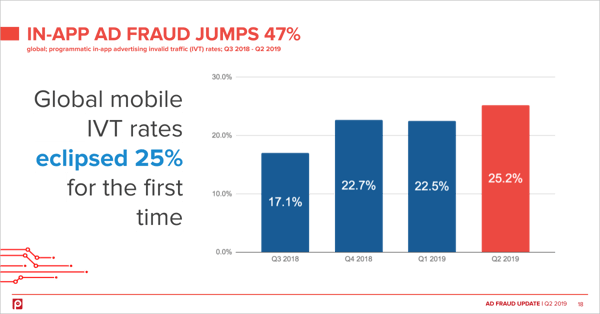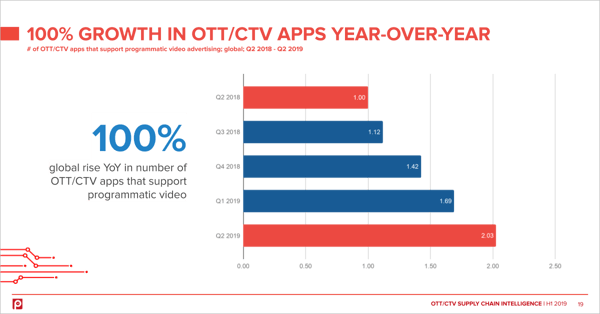
This week's review of ad fraud and quality in the digital advertising space.

Mobile in-app invalid traffic (IVT) rates for programmatic advertising climbed to new heights during Q2 2019. In our Q2 2019 Ad Fraud Report, we reveal the overall programmatic IVT rates for mobile in-app advertising.

How fast is programmatic advertising growing in OTT/CTV, the hottest new channel for digital advertisers? In our H1 2019 OTT/CTV Supply Chain Intelligence Report, we reveal the growth rate of OTT/CTV apps that support programmatic video advertising.

"Google Play Store has a malware problem. And it doesn’t seem to go away despite the company’s best efforts to rein in sketchy apps," reported The Next Web. In a yet another instance of Android adware, New Zealand-based independent security researcher Andy Michael found four Android VPN apps with cumulative downloads of over 500 million that not only serve ads while running the background, but are also placed outside the apps, including the home screen."

"Bad actors are exploiting VPAID to serve malicious auto redirects hidden within video ads," reported AdExchanger. "A loophole within the spec allows unauthorized parties to introduce arbitrary JavaScript and inject malware into a piece of creative."

*By entering your email address and clicking Subscribe, you are agreeing to our Terms of Use and Privacy Policy.
These Stories on Weekly Recaps
*By entering your email address and clicking Subscribe, you are agreeing to our Terms of Use and Privacy Policy.
Disclaimer: The content of this page reflects Pixalate’s opinions with respect to the factors that Pixalate believes can be useful to the digital media industry. Any proprietary data shared is grounded in Pixalate’s proprietary technology and analytics, which Pixalate is continuously evaluating and updating. Any references to outside sources should not be construed as endorsements. Pixalate’s opinions are just that - opinion, not facts or guarantees.
Per the MRC, “'Fraud' is not intended to represent fraud as defined in various laws, statutes and ordinances or as conventionally used in U.S. Court or other legal proceedings, but rather a custom definition strictly for advertising measurement purposes. Also per the MRC, “‘Invalid Traffic’ is defined generally as traffic that does not meet certain ad serving quality or completeness criteria, or otherwise does not represent legitimate ad traffic that should be included in measurement counts. Among the reasons why ad traffic may be deemed invalid is it is a result of non-human traffic (spiders, bots, etc.), or activity designed to produce fraudulent traffic.”

